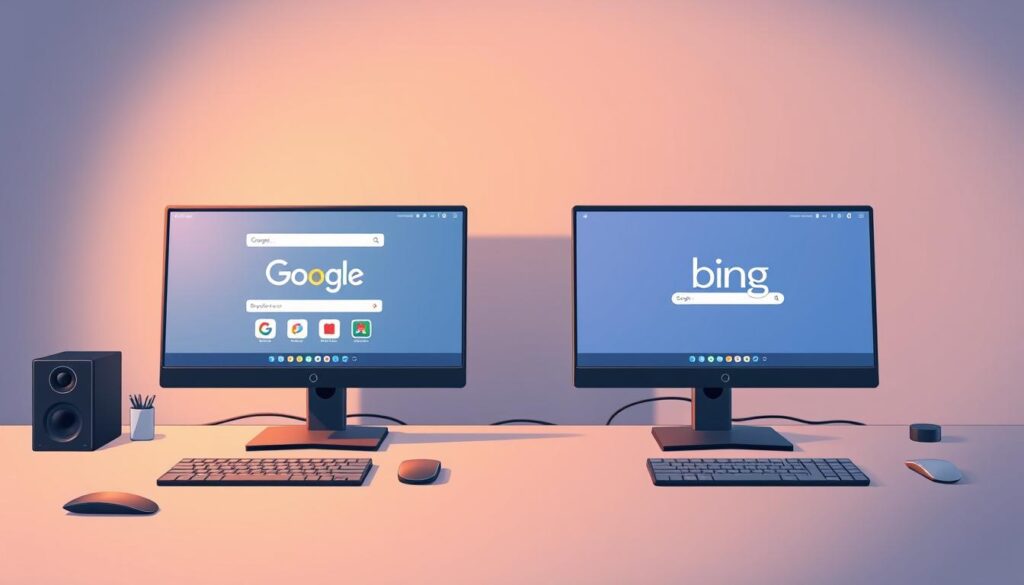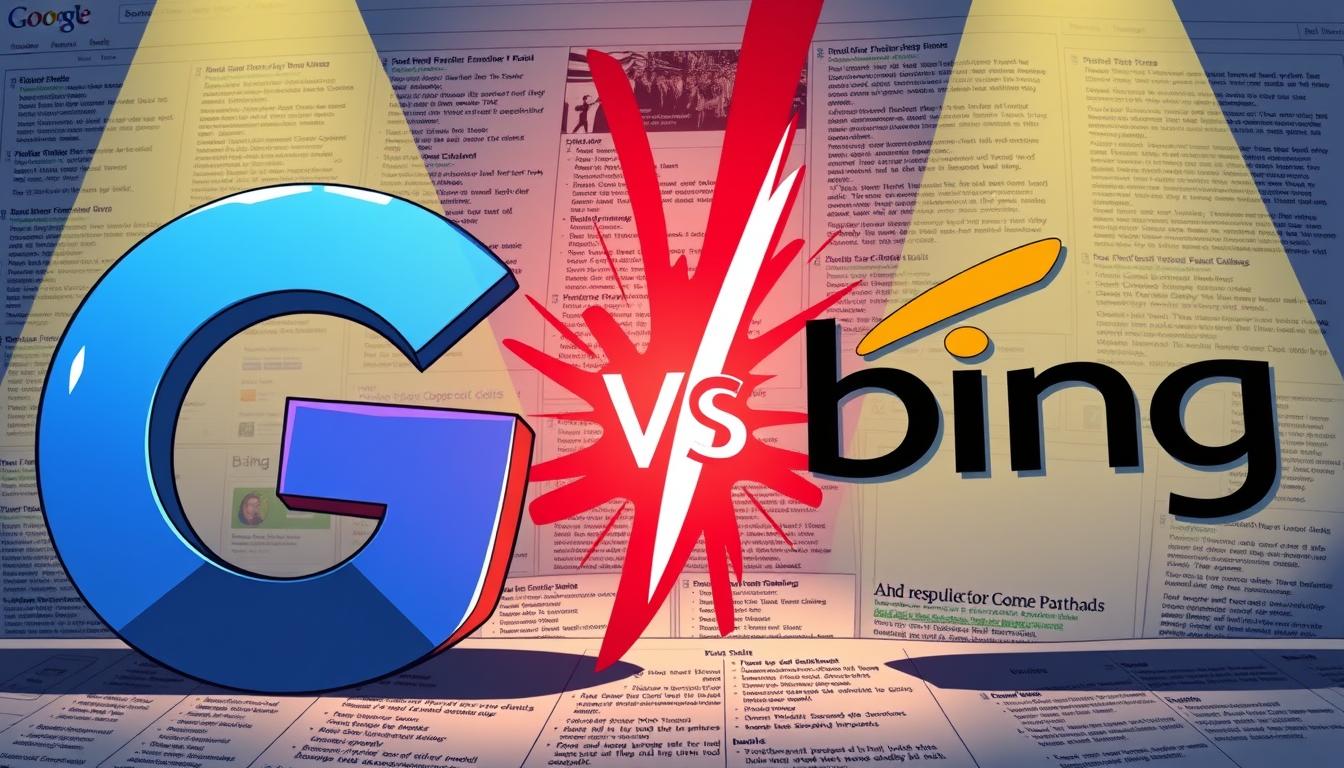In the fast-paced world of digital marketing, knowing how Google and Bing differ is key. Google is the big name, but Bing is also important. Businesses need to know how to use both well.
At Reputation Return, we see how big of a deal search engines are. Google has 1 billion users every day. Bing has 100 million. This shows how big these platforms are for your online image.
We help our clients get seen more online on both Google and Bing. Our team knows how each platform works. This helps protect and improve your online reputation.
Want to keep your online image safe? Reputation Return offers a free, private consultation to help you out. We’ll guide you through the complex world of online reputation.
Key Takeaways
- Google commands 89.73% of the global search market share
- Bing has increased its market presence to 3.98%
- Each search engine has unique ranking factors and algorithms
- Understanding platform differences is critical for digital reputation
- A complete strategy needs insights from both search engines
Understanding Market Share and User Demographics
The digital search world is a battleground between Google and Bing. Our comprehensive google vs bing market share gives us key insights into their performance and how users experience them.

Global Search Engine Market Distribution
Google leads the global search market with an 83.95% share as of July 2023. Bing, on the other hand, has grown its share to about 10.85% of desktop searches worldwide.
| Search Engine | Market Share | Global Ranking |
|---|---|---|
| 83.95% | 1st | |
| Bing | 10.85% | 2nd |
User Demographics Breakdown
The way users experience Google and Bing varies by age and other factors. Bing tends to attract an older audience, with notable traits:
- Average user age: 45 years old
- 50% have college education
- 33% have household income over $100,000
- 46% are married
Geographic User Distribution
Bing has a strong presence in certain regions:
- North America: Strongest market penetration
- United Kingdom: Nearly 25% desktop search coverage
- Canada: 22% desktop search market
- Australia: 16% desktop search representation
Knowing these market details helps businesses shape their online reputation strategies for different search engines.
Search Engine Features and Functionality

When we look at Google and Bing search results, we see special features that change how we search online. Both offer great search tools, but they work in different ways. This affects how users experience searching.
Some key features for both include:
- Text search with advanced filtering
- Image and video search capabilities
- Voice search integration
- Visual search technologies
Google stands out with extra search tools:
- Book search with access to a huge digital library
- Detailed flight search and comparison tools
- Comprehensive scholarly literature search
- Advanced financial information searches
Google’s search index has hundreds of billions of web pages. This is much bigger than Bing’s 8-14 billion pages. This difference affects how deep and wide the search results are.
Microsoft Bing has its own perks, like better video search results. It shows large thumbnails in a grid view. Bing also gives biweekly SEO reports with tips for digital marketers and website owners.
Knowing these features helps users and businesses improve their online presence. They can make sure they are seen and engaged on both platforms.
Core Differences Between Google and Bing Algorithms
Understanding search engine algorithms is key. Google and Bing have different ways of ranking websites. Knowing these differences can help improve your online presence.
SEO needs to be tailored for each search engine. Google and Bing have unique algorithms. This affects how well a website performs.
Mobile-First Indexing Approaches
Google focuses on mobile websites for ranking. Bing has a different method, not just for mobile.
- Google values mobile responsiveness a lot
- Bing also looks at mobile performance but less strictly
- Core Web Vitals are important for Google
Technical SEO Considerations
Google and Bing have different technical priorities. They both care about website performance but measure it differently.
- Google emphasizes page speed and user experience
- Bing looks at exact keyword matches
- Social signals matter more in Bing’s algorithm
“Understanding these algorithmic nuances is key for a good digital strategy.” – Digital Marketing Insights
Content Quality Assessment
Google has a strict content quality check. It looks at E-E-A-T (Experience, Expertise, Authoritativeness, Trustworthiness).
Bing’s content check is more traditional. It values readability, keyword use, and multimedia. Websites need to meet both Google and Bing’s standards.
Key Differences Between Google and Bing
Understanding the differences between Google and Bing search results is key. Google leads with 83.49% of the market, but Bing has its own way of ranking sites. This can affect how your online presence is seen.
When comparing Bing and Google SEO ranking factors, we find important details for digital experts:
- Keyword Treatment: Bing puts more weight on keywords in titles and URLs
- Domain Preferences: Bing likes official domains like .gov and .edu
- Social Signal Importance: Bing looks at social media activity when ranking
- Technical SEO: Google is better at handling JavaScript
Our study shows small but big differences in how Google and Bing rank sites. These differences can greatly change how visible you are online:
| Ranking Factor | Google Approach | Bing Approach |
|---|---|---|
| Backlink Importance | Critical ranking element | Less emphasis on backlinks |
| Social Signals | Limited consideration | Significant ranking factor |
| Content Evaluation | Natural language processing | Traditional keyword matching |
Adapting strategies for both platforms is vital for managing your online reputation. Knowing these differences helps businesses craft better SEO plans. This way, they can reach more people and get more engagement.
Search Result Page Layouts and Visual Elements
Digital marketers and online reputation managers need to know how Google and Bing differ. Both aim to give great search experiences, but they look different. Reputation management strategies must now include these differences.
Looking at visual elements, Google and Bing show big differences. Google has over 20 unique features on its search pages, making them rich and detailed. Bing, on the other hand, offers more visually appealing results, like in visual search.
SERP Features Comparison
Search result page features greatly affect how users feel. Key differences include:
- Google has more extensive featured snippets
- Bing shows social media content more
- Google has more structured knowledge panels
- Bing focuses on visual search elements
Visual Search Integration
Visual search is a key area for user interest. Bing has improved its search results to be more visually appealing, mainly for image and creative searches. Google leads with its machine learning visual recognition.
Local Search Display Differences
Local search experiences vary between Google and Bing. Google’s local search often has more details, like:
- Comprehensive business details
- Customer reviews
- Interactive map integrations
- More precise location-based recommendations
Understanding these nuanced differences can significantly enhance your online reputation management strategy.
Advertising Platforms and Marketing Tools
Understanding the digital ad world is key. Google and Bing have different strengths for marketers. They help reach more people and improve online presence.
Google Ads leads with its wide range of tools. It has a huge 91.20% share in the US search market. It offers great reach and targeting options. Key features include:
- Diverse ad formats (search, display, video, shopping)
- Integration with Google Analytics
- Immediate search result visibility
- Broad user base demographic targeting
Microsoft Advertising (Bing Ads) is a strong choice for those looking for a different approach. It may have less market share, but it has its own benefits:
- Lower average cost per click ($1.54 vs $2.32)
- LinkedIn profile targeting
- Less competitive advertising environment
- Higher conversion rates for specific industries
Marketers can use these platforms wisely. Bing reaches 5.4 billion monthly searches. It attracts 63 million unique searchers often missed by Google. It’s great for professionals aged 35-54 with higher incomes.
Effective online reputation management requires understanding the nuanced differences between these advertising ecosystems.
By choosing and optimizing ads on both platforms, businesses can create a strong digital marketing plan. This plan boosts visibility and engagement.
AI Integration and Future Development
The world of search engines is changing fast, thanks to artificial intelligence. Google and Bing are leading the way in making search better for users. AI is changing how we search online, making it smarter and more interactive.
Now, search engines use advanced AI to give us better results. Microsoft’s Copilot and Google’s Gemini are big steps forward in the search game.
Microsoft Copilot: Redefining Search Interactions
Microsoft Bing has changed its search game with Copilot, an AI assistant. It’s built on GPT-4 tech. It offers:
- Real-time info
- Chat-like search
- Deeper language understanding
Google Gemini: Advancing Search Intelligence
Google’s Gemini is a big leap in making search better. It brings AI to life in many ways:
- Handling different types of content
- Getting what you mean better
- Using smart learning algorithms
| Feature | Microsoft Copilot | Google Gemini |
|---|---|---|
| Technology Base | GPT-4 | Custom LLM |
| Information Currency | Real-time updates | Continuous learning |
| Search Integration | Conversational | Contextual |
These AI updates are a big deal for search tech. They promise a future where searching online is easier and more personal for everyone.
Analytics and Performance Tracking Capabilities
Understanding search engine analytics is key. Google and Bing have tools for tracking performance. Google leads with about 91% of the market share.
Google Analytics started in 2005 and changed in 2023. It now focuses more on user actions and events. This change helps businesses understand their online performance better.
- Real-time data tracking for complete insights
- Advanced goal tracking for businesses
- Integrated advertising platform analysis
Bing Webmaster Tools, launched in 2009, offers a different way to track performance. Its easy-to-use interface gives webmasters detailed SEO insights. It has features like:
- Sitemap submission capabilities
- Crawl error identification
- Detailed site performance metrics
The google vs bing market share analysis shows their analytics differ. Bing Webmaster Tools is great for:
- Indexed page visibility
- Incoming link analysis
- Comprehensive crawl request insights
Both platforms track important SEO metrics. They show clicks, impressions, and average click-through rates. Google may lead, but Bing has tools for website improvement.
Effective online reputation management requires leveraging the unique strengths of both Google and Bing’s analytics platforms.
Implications for Online Reputation Management
Managing your online reputation is complex. It requires a strategic plan that looks at the differences between Google and Bing search Knowing how these search engines work is key for businesses wanting to keep their online image strong.
It’s important to understand how Google and Bing show search results. Each has its own challenges and chances for growth. A strategy that fits each platform is essential.
- Monitor search rankings across both platforms
- Create diverse, high-quality content
- Implement platform-specific optimization techniques
- Respond promptly to online feedback
Proactive reputation management can turn digital threats into chances for your brand to grow. Businesses need a plan that works on both Google and Bing. This plan should match each search engine’s unique rules.
| Platform | Reputation Management Focus | Key Strategies |
|---|---|---|
| Comprehensive content strategy | Rich media, authoritative backlinks | |
| Bing | Local and social media integration | Social signals, local content optimization |
Studies show that 84% of people trust online reviews as much as personal advice. This highlights the need for a strong online reputation on many platforms.
Effective online reputation management is not about being perfect. It’s about being real and open in your communication.
Best Practices for Managing Reputation Across Both Platforms
Managing your online reputation is complex. It needs a smart plan that uses Google and Bing’s special features. Knowing how Bing and Google rank sites is key for businesses wanting a good online image.
Our team suggests a detailed plan. It focuses on the differences in how Google and Bing users search:
- Make multi-platform content strategies that work for both search engines
- Use high-quality, varied content to attract different users
- Boost Bing visibility with strong social media signals
- Use smart backlinking for Google’s algorithm
Important tips for managing your reputation include:
| Platform | Key Optimization Strategies | User Experience Focus |
|---|---|---|
| Mobile-first indexing, content relevance | Speed and personalization | |
| Bing | Social signals, multimedia content | Visual richness and detailed results |
Google is the big player with over 90% of searches worldwide. But Bing has its own benefits. By using a smart strategy for both, businesses can control their online image and get more visibility.
Strategic reputation management is not about controlling narrative, but about proactively shaping your digital presence across multiple search platforms.
Conclusion: Crafting a Balanced Approach to Online Reputation Marketing
Understanding the digital world is key to online reputation marketing. Our analysis shows how Google and Bing can help protect your brand. Google leads with 90% of searches, while Bing has a big share in some areas.
Managing your online image well means using both search engines’ strengths. Google is big on mobile, but Bing is strong in some places. We help you get seen more on both, keeping your brand safe online.
At Reputation Return, we get how complex digital marketing is. Our team creates plans that work with Google and Bing’s rules. We make sure your online look is top-notch, using both tech and strategy.
Ready to protect your online brand? Reputation Return offers a free, private chat to talk about your challenges. Our experts will create a plan just for you, making sure your brand shines on all major search engines.

